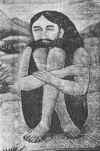| the-south-asian.com AUGUST 2001 | ||
| about us contact us data bank past issues the craft shop the print gallery | ||
|
SOCIETY & CULTURE Traditional
societies - Wisdom and Challenges SOUTH ASIAN FEATURE Hands
Across Borders INTERVIEW
Shantiniketan
and origin of Modern Art
Reinventing
India
Royal
Bengal's last roar?
|
Page 6 of 7
by Salman Saeed " Go not far , sasui , nor give up the quest, walk not with your feet, yet sit not quite content, All connection with joys of life snap, Walk with your heart , that the journey may soon end."
Shah Abdul Latif Bhitai - Poet Laureate of Sindh Shah Abdul Latif Bhitai was born in the small village of Bhit [ the
mound] about 150 miles north of Karachi . His Urs is held every year between
the 13th and 15th of Safar , the second Islamic lunar month. Shah Latif can be said to be the soul of Sindh. He was a great saint , a
nationalist , a humanist and a poet whose stature is perhaps on par with the
great poets of the world [Byron, Keats , Selley, Neruda, Rilke, Rimbaud, etc
] . Just as the Elizabethan period [ 1500-1700] is known more for
Shakespeare than for the empire-builders as Raleigh and Sir Francis Drake [
whose plunder of the Spanish gold armadas earned him the knighthood from the
Queen] , so the Kalhora period of Sindh history [ which managed to withstand
Nadir Shah's invasion of Delhi in 1739 ] will be remembered more for
Shah Latif’s poetry. The Kalhoras period during which Shah Latif lived ,was a period of great
prosperity and the towns of Thatta and Hyderabad thrived under the good
governance [ low taxes, canal irrigation , textiles ] of the Kalhoras who
were originally ruling the north of Sindh near Sukkur. The East India
Company described Thatta "as large as London" ; International
commerce gave Thatta its prominence with textiles exports and 4000 ships
& boats and 400 schools. The Kalhoras were to squeeze out the Sammas and
the Soomros who ruled the southern parts of Sindh. The great romance of
Sasui-Punhu was born in the Sammas period [ 1300- 1500] and which Shah Latif
later made the subject of his Surs. "Shah Jo Risalo" the message of Shah His poetry was first translated into German in 1866 [a hundred years
after his death] by Ernest Trump a German scholar and missionary when in
1860’s he became fascinated by Sindhi language and culture and the jogis
and singers who sang Shah Latif’s verses [ganj]. With the help of Sindhi
scholars he compiled a selection of the original verses and called it
"Shah Jo Risalo" [the message of Shah]. Later in 1940, D.H. Sorley an English scholar learnt Sindhi, and
published selections from the Risalo by the Oxford University Press entitled
"Shah Abdul latif of Bhit - His Poetry,Life and Times". The most recent work [ 1994], from which most of the translations given
here are taken from , is that of Amena Khamisani a professor in English
Literature at the Sindh University. Much of Shah Bhitai’s poetry expresses the individual seeking for God
in terms of well-known ballads and the negation of the ego. In Islamic
tradition the seeker and the sought are both males. Shah following the
Indian tradition made his individual a female. Shah’s heroine’s come
mainly from the lower strata than the heroes, and yet they outshine the men.
The divine is the beloved , with the feminine form associated with earth
fertility, nurture, wisdom, and intuition and the masculine with rationality
an logic.
Copyright © 2000 - 2001 [the-south-asian.com]. Intellectual Property. All rights reserved. |
|
